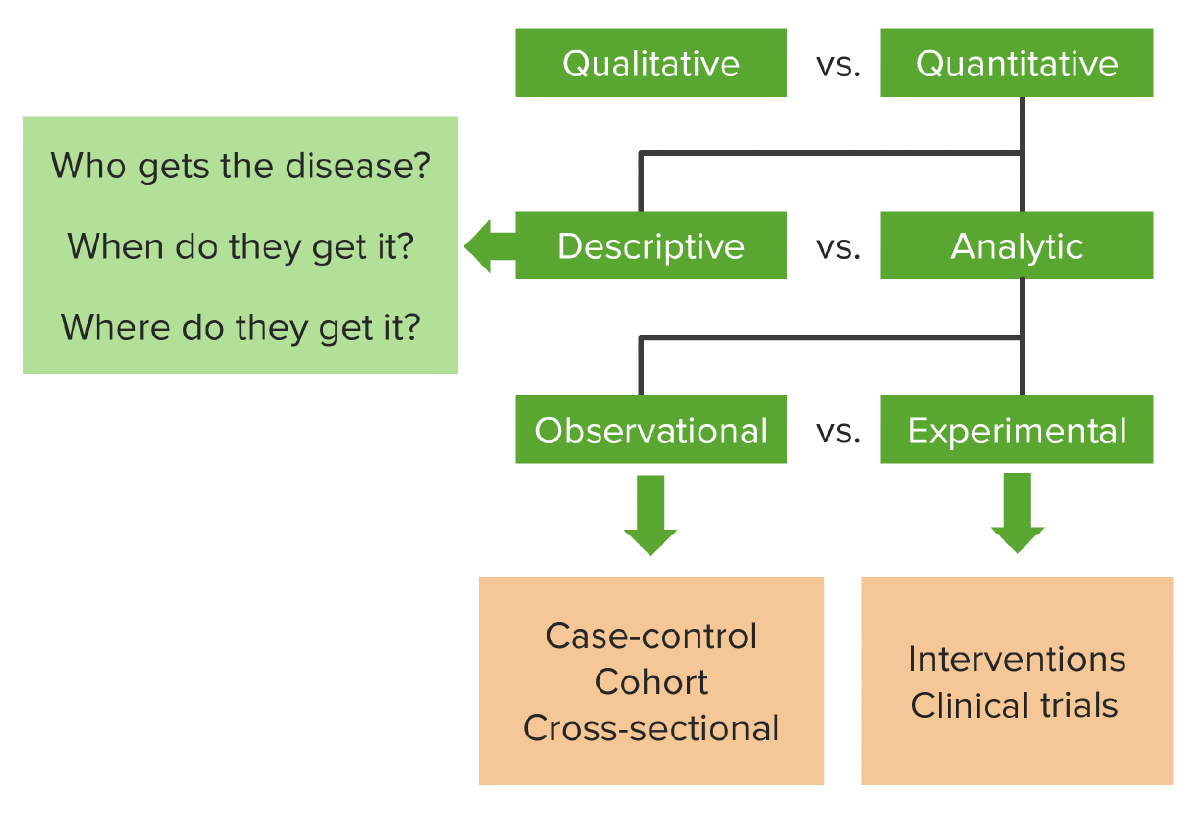Playlist
Show Playlist
Hide Playlist
Study Design Types – Critical Thinking and Evidence Based Medicine (EBM)
-
Slides 02 CriticalThinking Epidemiology.pdf
-
Reference List Epidemiology and Biostatistics.pdf
-
Download Lecture Overview
00:00 So let's talk about now some of the studies that you might find and in another lecture we're going to go further in detail into the qualities of these studies and why some might be more causal or of higher quality than others. The first is the RCT, or the randomized controlled trial. This is when you've got a group of patients that been randomly allocated into two groups; one group received the treatment and the other group receives a placebo or control. This is considered to be the gold standard of evidence, because we can reliably test for causal relationships. Did this treatment cause that outcome? We would like to find RCTs, RCTs make us excited. The next two studies are going to be cohort and case-control studies. 00:47 These are what we call observational studies, we don't interfere in the variables of observational study, instead we watch them unfold in the universe naturally. The first observational study is the cohort design, that's when we find some people who've been exposed to something of interest, some other people who haven't been exposed and we look forward in time to see the proportions in each of those groups that determine an outcome. Similarly a case control is also an observational study, but it's backwards, it's the opposite of a cohort study. That's when we ascertain which patients have the outcome we care about, those are the cases, we find some other patients who don't have that outcome, those are the controls, we look back in time to see who had the exposures of interest and again, we're going to go in greater detail into these designs in a future lecture. Case series are a poor quality of evidence, they are descriptions of individual patients and very often there is no control group involved. A case report is one instance, several reports make up a case series. Systematic reviews on the other hand, are considered to be very good evidence depending upon the studies that are included in them. A systematic review is a summary of literature of several studies that have been brought together to answer a larger question. Related to systematic review is a meta-analysis and some people confuse the two, some people will use the term meta-analysis and systematic review interchangeably, but they are distinct concepts and meta-analysis is when we take the summaries or the estimates from a variety of studies and mathematically synergize them all, if that's a word, we make one estimate from all of them, mathematically. 02:33 A systematic review doesn't necessarily do that, so a systematic review can include a meta-analysis, but it doesn't have to. So those are the six basic large categories of study types that we will find in our search, again the RCT is the gold standard, a systematic review of RCTs might even be better. 02:59 So what do we do with all this information now? We're going to use our well phrased research question to search for evidence, to search for which studies are relevant to the question that we care about and we're going to apply what's called the pyramid of evidence to determine which studies we should perhaps give more weight to because they're probably better.
About the Lecture
The lecture Study Design Types – Critical Thinking and Evidence Based Medicine (EBM) by Raywat Deonandan, PhD is from the course Epidemiology and Biostatistics: Introduction.
Included Quiz Questions
What type of study follows a group of people forward in time to see if they develop a disease, without the investigator intentionally exposing them to any factors?
- Cohort study
- Randomized controlled trial
- Case-control study
- Cross-sectional study
- Case reports
What type of study compares a group of cancer patients to a group of healthy subjects to see which group was more likely to have smoked in the past?
- Case-control
- Cohort
- RCT
- Cross-sectional
- Case series
What is the defining feature of a meta-analysis that differentiates it from other types of systematic reviews?
- A meta-analysis uses quantitative methods to summarize the results.
- A meta-analysis only uses case-control studies to summarize the literature on a topic.
- A meta-analysis requires there to be control groups in the studies it combines and analyzes.
- A meta-analysis is a series of case reports combined to create a single report.
- A meta-analysis and a systematic review are the same and the terms are used interchangeably.
Customer reviews
4,0 of 5 stars
| 5 Stars |
|
0 |
| 4 Stars |
|
1 |
| 3 Stars |
|
0 |
| 2 Stars |
|
0 |
| 1 Star |
|
0 |
Pretty good, but needs more information about each type of study




